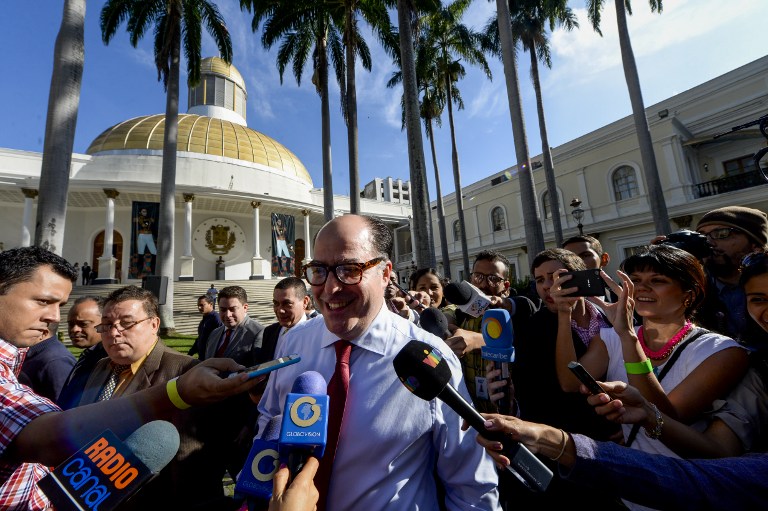
Crisis-hit Venezuela’s divided opposition relaunches fraught efforts on Thursday to oust Socialist President Nicolas Maduro. Outgoing assembly speaker Henry Ramos Allup said it was “useless to negotiate with a dictatorship.” Ramos is due to be replaced as speaker by the opposition’s parliamentary group leader Julio Borges. Borges has vowed to work for “unity” within the opposition. / AFP PHOTO / FEDERICO PARRA
by Maria Isabel SANCHEZ
Agence France-Presse
CARACAS, Venezuela (AFP) – Venezuela’s opposition said Thursday it will seek to trigger early elections by declaring President Nicolas Maduro has “abandoned his post,” launching a new year of political battles in a country fighting off economic collapse.
Kicking off its second year in control of the Venezuelan National Assembly, the opposition installed a new legislative speaker and announced a fresh offensive against the leftist president it has vowed to oust.
“In the coming days, we will approve a declaration that Nicolas Maduro has abandoned his post,” said the new speaker, 47-year-old lawyer Julio Borges.
Venezuela’s constitution says the National Assembly can force the president’s replacement by issuing such a declaration.
But Maduro has easily swatted down the opposition’s maneuvers against him so far, using his grip on the courts, electoral council and military to stymie its previous strategies against him: a recall referendum, a legislative onslaught and street protests.
Borges appeared to anticipate an uphill battle.
“If anyone has doubts about the arguments for doing this, know that since 2013, more than 100,000 Venezuelans have been murdered. More than one million jobs were lost last year. Inflation since Maduro became president is 4,200 percent. One in 10 Venezuelans eats trash from the streets,” he said.
His swearing-in marks the start of the opposition’s second year in control of the National Assembly, after winning legislative elections in December 2015.
But Borges is likely to run into the same problems as his predecessor in the opposition’s top elected office, Henry Ramos Allup.
During Ramos’s year in the post, the Supreme Court invalidated nearly every bill the National Assembly passed.
When lawmakers tried to ignore its rulings, it declared the majority bloc in contempt of court.
Electoral authorities meanwhile blocked efforts to force a referendum on removing Maduro from power.
‘Radically Chavista’ VP
Maduro announced his own leadership reshuffle Wednesday, naming a new, hardline vice president and overhauling his cabinet.
Tareck El Aissami, who as vice-president will take over from Maduro if the latter is removed or resigns, describes himself as “radically Chavista” — the name of the movement founded by Hugo Chavez, Maduro’s late predecessor.
El Aissami, a 42-year-old of Syrian and Lebanese ancestry, is a powerful state governor and former security minister known for cracking down on drug gangs.
The shake-ups on both sides set up a new year of clashes between the opposition Democratic Unity Roundtable (MUD) and Maduro, who has hung onto power despite presiding over an economic crisis marked by food shortages and deadly riots.
Battered by low prices for its key export, oil, Venezuela is mired in a deep recession and has the world’s highest inflation rate.
Maduro blames the crisis on a “capitalist conspiracy” backed by the United States. His opponents say it represents the failure of 18 years of leftist rule.
Venezuelans appear fed up with both.
Nearly 80 percent disapprove of Maduro’s leadership, according to a recent survey by polling firm Datanalisis.
Support for the MUD has meanwhile fallen to just 38 percent, according to a study by consultancy Keller and Associates.
Appeal to military
Borges appealed to Venezuela’s military to turn on Maduro.
“Brothers in the armed forces, Nicolas Maduro is outside the constitution, and that is unacceptable,” he said, to cries of “putschist” from Maduro allies.
Undeterred, Borges called for new general elections, saying: “Let the people decide.”
Maduro, who has proven deft at exploiting the opposition’s divisions, meanwhile sought to pit Borges against his predecessor.
He said they had met and that Borges had vowed to resume stalled talks with the government, which have split the MUD.
“Borges gave me his word… he would take part in the dialogue. And he told me to say, ‘The crazy old fart is gone, I’m going to hold talks.'”
Borges denied the claim.







